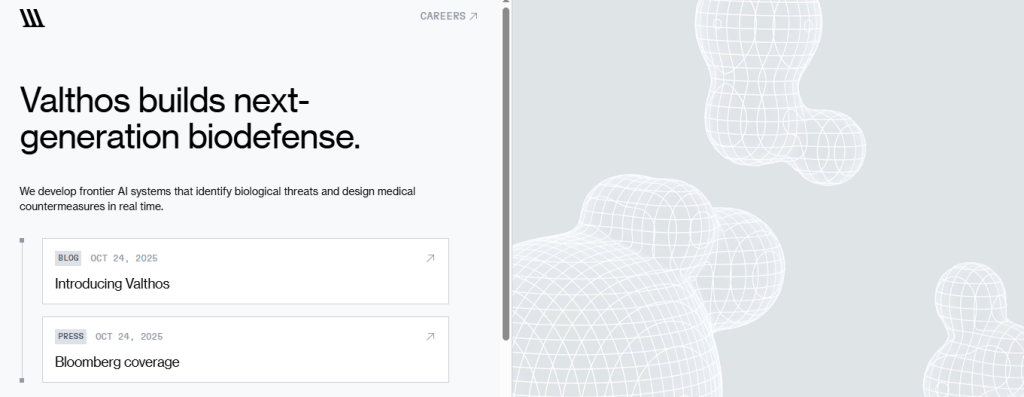Valthos Raises $30 Million in Seed Round to Build AI-Driven Biodefense Platform
November 2, 2025
byFenoms Start-Ups

Valthos Inc., a startup at the intersection of artificial intelligence and biotechnology, has closed a $30 million seed financing round, backed by the OpenAI Startup Fund, Lux Capital and Founders Fund. Founded by Kathleen McMahon and Tess van Stekelenburg, Valthos is building infrastructure to detect biological threats and design medical counter-measures in near real-time.
The raise comes at a moment when biotech capabilities and adversarial risk are both accelerating, and Valthos’ mission is clear: create a software-driven defense layer capable of identifying emerging threats and generating responses as fast as they emerge. The investment will fuel the build-out of its engineering and biology teams, scale infrastructure for data acquisition and AI analysis, and set the stage for deeper collaboration with pharmaceutical and biodefense stakeholders.
Reframing Biodefense: From Response to Anticipation
Traditional biosecurity models are reactive: monitor for outbreaks, then develop vaccines or therapies. Valthos flips that script. The company’s tech side builds AI pipelines that characterize novel biological sequences, map threat profiles, and compress the reaction time into something closer to real-time. Kathleen McMahon describes the core asymmetry: “It’s easier to make a pathogen than a cure.” Valthos’ goal is to invert that dynamic. By embedding advanced machine-learning models, computational biology, and distributed data architecture, the startup positions itself not just to respond - but to anticipate.
Instead of waiting for pandemics, Valthos prepares for them. Instead of building a cure after the fact, it designs counter-measures before they’re needed.
Platform Over Product: Building the Infrastructure of Biodefense
Rather than launching a single therapeutic or diagnostic kit, Valthos is building what might be called the “operating system” of future biodefense workflows. Its founding team brings experience from Palantir, DeepMind, the Broad Institute and MIT’s Arc Institute - signalling both deep biotech grounding and scale engineering expertise. Valthos is designing systems for integrating air, wastewater and genomic monitoring data, applying AI to detect anomalies, and generating actionable outputs or countermeasure designs where time matters most.
For founders building in regulated or high-stakes fields, the strategy is instructive: develop the infrastructure now, layer on missions later. Valthos is laying the architecture today so that future use-cases can plug in seamlessly. This is how you build defensibility beyond the first deployment.
Deep Insight for Founders: Architect for Change Before the Market Changes You
Many startups wait for regulatory crises or competitive pressure to shift their architecture. Valthos is designing for acceleration. They aren’t just responding to today’s threat environment - they are building for tomorrow’s risk profile. The insight: When your domain is evolving faster than regulation, pipeline or market adoption, build your infrastructure to anticipate change. When you treat your architecture as future-proof rather than a retrofit, you unlock an advantage few founders achieve.
Most companies innovate features.
Valthos innovates workflows.
And in high-stakes fields like biodefense, workflows trump features. Because when time, coordination and cross-domain data matter, your system becomes your moat.
Investor Confidence & Strategic Momentum
The roster of backers in this seed round signals more than capital. OpenAI Startup Fund’s participation indicates the convergence of AI infrastructure with high-stakes domain application. Lux Capital and Founders Fund bring experience scaling deep-tech companies that bridge hardware, software, biotech and national-importance markets. Investors are not betting on just a startup - they’re betting on a solution to a global asymmetric threat. For founders, this means you need more than a good story - you need structural mission, cross-domain engineering and scale potential.
A Market Poised for Disruption
The biodefense landscape is facing both a crisis and an opportunity. Governments and private actors are re-thinking biosecurity with urgency. The global biodefense market is estimated at around USD 17.8 billion in 2024, and projected to grow to approximately USD 29.9 billion by 2030, with an annual growth rate near 8.6%. Meanwhile, other sources place the CAGR at 7%-8% and forecast values beyond USD 30 billion by 2033/2034. Epidemiological, geopolitical and technological factors are converging.
Beyond biosecurity, the convergence of AI and biotech is re-writing industry fundamentals. The global AI-in-Healthcare / AI-in-BioTech market is forecasted to reach tens of billions of dollars by the end of the decade, growing at a CAGR above 30%. That means more data, smarter systems, faster iteration - and for companies like Valthos, that means the infrastructure they’re building isn’t nice-to-have; it’s becoming mission-critical.
Interest is surging in detection systems, rapid diagnostics, pathogen prediction, genomics analysis and synthetic biology - areas where latency used to kill value. Valthos is operating where biology becomes software, and threats become data.
This isn’t just a niche play. It’s the foundation of a new infrastructure layer for global risk mitigation.
What’s Next for Valthos
With $30 million secured, Valthos is accelerating hiring across computational biology, ML, software engineering and biodefense operations. The company plans to scale its platform for both commercial and government customers, partner with life sciences firms for manufacturing pipelines, and expand its data ingestion capabilities globally. The first deployments may target high-sensitivity monitoring networks; later stages will embed their infrastructure into standard biodefense workflows.
Valthos isn’t just planning to ship a product - they’re preparing to shift how defense against biological threats is architected.
Final Thoughts
This seed round is more than an early-stage investment. It is affirmation of an idea whose relevance has grown faster than its publicity. Valthos is not just developing tools. It is building a system of readiness for one of the most complex threats of our time. By aligning deep-tech, space-scale software and biotech design, the company stands to become foundational in the emerging ecosystem of AI-driven biodefense.
In a world where biology is becoming software - and threats are becoming automated - Valthos is building the guardrails.









